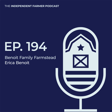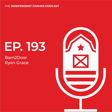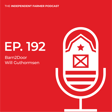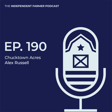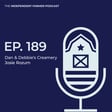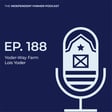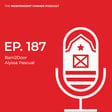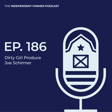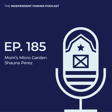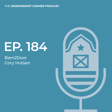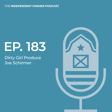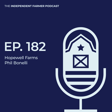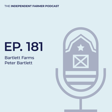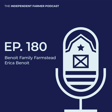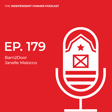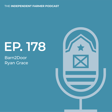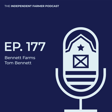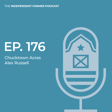Become a Creator today!Start creating today - Share your story with the world!
Start for free
00:00:00
00:00:01

Pricing Farm Products for Profit with Old Rich Valley Farm
In this week's episode, James meets with Will from Old Rich Valley Farm in Virginia to discuss Farm product pricing. Will explains how to price different product types, communicating the value of sustainable agriculture and reevaluating costs yearly.
For more resources to spur sales for Independent Farmers, streamline operations and access local Buyers, visit https://www.barn2door.com/resources
Transcript
Introduction to Independent Farming
00:00:10
Speaker
Hello and welcome to the Independent Farmer Podcast, the go-to podcast for do-it-yourself farmers who are taking control of their own business, skipping the middleman, and selling direct to local consumer and wholesale buyers. This podcast is hosted by Barn to Door, the number one business tool for independent farmers to manage their business, promote their brand, and sell online and in person. Let's dive in to today's Independent Farmer Podcast.
00:00:42
Speaker
Welcome to the Independent Farmer podcast. I'm James, the COO at Barnadore and your host for today's episode. As many of our listeners may be aware, Barnadore offers software for independent farmers to create and promote their brand, sell online and in person and save time managing their business. Today, I'm happy to speak with Will Campbell from Old Ridge Valley Farm in Virginia today.
00:01:04
Speaker
Will and his wife Amy are part of our farm advisory network and have built a presence online to expand their farm sales.
Pricing Strategies for Farmers
00:01:10
Speaker
Today, we will be discussing pricing farm products for success. When you are an independent farmer, you have the freedom to price your products as you see fit. However, some farmers believe they need very low prices to ensure sales and compete with the local grocery store. But Will has maintained strong prices that match the value of his products and buyers are willing to pay for it.
00:01:30
Speaker
Tom Bennett has said, don't get in a race to the bottom in terms of pricing. And I believe Will agrees with that. I'm excited to talk with Will today about how farms decide on pricing their products and what buyers can expect from their products and how their prices have changed and evolved over time. Welcome, Will. Thanks for joining me today. How are you doing? Hey, good to be here. Thank you for having me.
00:01:52
Speaker
Well, first off, before we dive into talking about pricing products, why don't we talk a little bit about your farm. You and Amy, why don't you share a little bit of history about Old Ridge Valley Farm, how long you've been farming, how you got into it.
00:02:03
Speaker
I grew up here in Rich Valley. Our farm's located in Southwest Virginia and I grew up on a beef cattle farm and Amy and I, we've been married for going on 12 years and she was teaching and I was farming raising beef cattle. And then probably five years after that, so it's probably been seven years ago, we started selling direct to consumer. We started diversifying the farm, adding chickens and adding meat, birds, egg layers, pigs. And then another year or two after that, Amy
00:02:33
Speaker
Gives up teaching to help do the farm stuff. And we're just praying and hoping we can keep on doing what we're doing. Well, you guys have been certainly blessed. It's been fantastic to see the success of your guys's farm. And I would say she has not given up teaching. I mean, she does a really fantastic job. That's true. Talking a lot about the practices, things you guys have employed on your farm. Why don't you tell listeners a little bit about your guys's commitment to regenerative agriculture and what you guys are doing in terms of diversifying your farm.
Commitment to Regenerative Agriculture
00:03:00
Speaker
We got turned on to Joel Salatin and just the way he talks about diversity in nature and how living things benefit other living things and depend on other living things. It just made sense. So if we can add chickens to our farm that will improve our soils and our pasture and make better grasses for our cows, just that his way of looking at farming just made sense. And we really love the direct model. I started out selling beef cattle on the commodity market and
00:03:29
Speaker
whenever we started with our herd, beef cattle prices were just crazy high. I don't know, it was maybe sell 800 pounds steer for a couple thousand dollars and then a couple years later the prices go back down and next thing you know that steer is worth half that. But our payments were the same and our feed costs were the same. As far as farming and raising a family, we didn't
00:03:49
Speaker
really want to ride that roller coaster for the rest of our lives. Farming has enough factors that are outside of our control, right? We can't control the weather patterns or the rain or the sunshine. If you're farming, you're dealing with lots of uncertainty as it is. And for us, if our pricing and margins was one of those things that we can take control of, then we felt like we should. And that way if we don't make it, at least it'll be on us.
00:04:14
Speaker
Yeah, that's really well set. And candidly, just like you said, you don't control the prices of your inputs, right? And if you can't control the price of the output, you're really stuck in the middle with whatever you're going to get on either side, right? And like you said, there's that squeeze. And I know that it's not unique, just a cattle. That's true with pork and certainly true with chicken in the large commodity markets. And it's really tough too, particularly when you have somebody like yourself who's committed to such a great livelihood and caring for these animals.
00:04:41
Speaker
particularly for the first called 12 to 18 months. And then if you take them to auction, they're going to be fattened up on a CAFO and they're not going to have a very good ending to their life, right? It's not very humane, right? By any means to your point, you're also giving up all the margin in terms of the final price that a consumer is actually willing to pay. So let's talk about that transition. Cause this is a big one we talk with and we work with a lot of farmers and ranchers, just like yourself, who've made this transition or who want to make this transition going from selling at auction or signing on the commodity markets to selling direct.
00:05:11
Speaker
How did you and Amy get your start with that? Were you just starting to sell some quarter half and hold to some friends and families through church or some folks you knew locally? And then what really kept the scale beginning to say, okay, we can really make a run at this.
Scaling Direct-to-Consumer Sales
00:05:23
Speaker
Yeah, that's a good question. Like I said, we kind of fell in love with Joel Salton's perspective on farming and we even went and visited his farm and took the farm tour and got to talk with him and ask him questions. I'm sure he wouldn't recognize me if he saw me now, but I remember asking him questions about, okay, how can we do what you're doing? And the piece of advice that he gave that really stuck with me was to start small.
00:05:43
Speaker
and that wasn't what i wanted to hear at the time because i wanted to just snap my fingers and get to where we're rocking and rolling but it was really good advice because you're going to make mistakes and you start small your mistakes are small and then you can figure out how to do it right and then you can scale out whatever works for you.
00:05:58
Speaker
So the first meat chickens that we raised, we raised in our front yard and we figured out that we could do it. And we kind of liked messing with them. And then we, we had shelters and then there were other people, friends and family and neighbors that said, you know, that's pretty good chicken. We like it. And we liked the way you're raising it. And so we just kind of started small and then gradually grew as our Tom would allow. And as the market.
00:06:18
Speaker
grew with it. We actually did probably four or five farmers markets. We were trying to go to several farmers markets. And we live out in the middle of nowhere. We're in pretty rural country. It's not a very highly populated area. That was one of our concerns, trying to make that transition anyways, as you hear about the importance of being in a good location outside of a lot of people. And we just didn't have that. And so we did have some reservations about if this transition for us is actually a possibility or not.
00:06:44
Speaker
have done a fantastic job. I know Joel's just actually right up the road from you. I would say right up there a few hours from you, but they're in rural Virginia. I know he sells into a small market too in Staunton, Virginia. I mean, that's only a small city of 25,000 people, right? Now there's certainly, he sells probably to some folks up in the metropolitan areas, but you guys have done a pretty good job selling down into North Carolina, correct? You guys actually went down, not just locally, but you guys went over the border as well and were able to tap into that market as well. Is that correct?
00:07:12
Speaker
Yep, we have a little bit. We have some friends down outside of Asheville that were actually were pretty influential and encouraging us to make that transition. They were one of the first ones that mentioned Joel Salton whenever we were farming and looking through direction. And Amy's from Knoxville. That's where she grew up. And so there's some families down around where her community where she goes down there once a month and takes some meat to people that order or have heard shares.
00:07:37
Speaker
We try to get it to people around. We know that it's not realistic for everybody to come out here to the farm to pick it up. And so we try to do running to help get it a little closer to them. Yeah. You guys have done a fantastic job just seeing the number of subscriptions you guys have built and number of loyal buyers you've built over time. Cause like you said, it takes time. You can't just snap your fingers and all of a sudden be able to sell an entire animal broken down into specialty products. Right. I still see you and still to this day, you guys sell quite a bit at quarter, half and whole.
00:08:05
Speaker
which is fantastic. It's good revenue for you. You guys also sell a lot of specialty cuts. So let's talk a little bit about pricing, right? Cause there's a big difference between pricing products as a quarter, half or whole versus burgers. I saw, I think this past month, like one of your guys's top selling products was bacon. Clearly everyone loves bacon, but you guys also are selling a lot of beef like ground beef and hamburger patties, those types of things. How have you guys, when you thought about that, both in terms of packaging, let's talk packaging first, and then let's talk pricing.
00:08:33
Speaker
First off, how did you guys start to think about packaging? Because not everybody has a chest freezer and has the space to do a quarter half or whole, right? How did you guys start to think about what was going to be your first entry into going direct to market beyond quarter half and whole?
00:08:47
Speaker
Right.
Financial Sustainability in Farming
00:08:48
Speaker
Like you said, the quarter half and whole is easiest for us because we can move meat in proportion to the whole animal, which is nice to get rid of a lot at once. But we also know that a lot of people are used to going to the grocery store and picking out a couple of this couple of that. And so we just try to provide opportunities for people that want the holes or halves or people that want bulk or people want to pick and choose what they want. And so we're just trying to.
00:09:10
Speaker
make it all available, but the trick is just making sure that it's all priced right, right? Because we have to make sure that the numbers add up with each option, I guess. And we've certainly learned a lot the hard way, a lot of trial and error when it comes to that. I think whenever we first transitioned and started selling directly,
00:09:30
Speaker
And this is just ignorance on our part, but we just kind of assumed that if we're selling directly, of course we're making money, right? We were just trying to price it as reasonable as we could. Just trying to think, okay, this sounds fair and then sell it and then hope at the end of the day that there's more money at the end of the year than there was starting out. And then sometimes there wasn't and what it costs us to produce it, right? That's kind of what it boils down to.
00:09:53
Speaker
as farmers and I'm sure I'm not speaking for all farmers but certainly most I feel like most people are farming not because they're passionate about the the pricing or the money or I don't know many farmers or any farmers that are farming because they're wanting to get rich doing it even though I'm sure there are some that do but we farm because we love it because we're packing about it and most farmers that we know care about the land and the animals and the health
00:10:16
Speaker
And so the financial side of it is not our reason for doing what we're doing, but also our passion for farming is not going to keep us farming if the numbers don't add up, right? It's not a get rich quick scheme by any means, right? Like you're not going to just get rich overnight farming, right? You really have to have a passion for it, but you have to still make a living. You've got four children, right? You've got mouths to feed, right? You've got a roof over your head. You got bills to pay. So it's this balance between your love and passion for what you're doing clearly. And then the price that you have to charge at a minimum
00:10:46
Speaker
not only to cover your costs, but to actually make a profit, right? Cause otherwise you're working for free or going in debt and that's not a good option, right? Too many farmers are too far in debt and that's creates an enormous amount of financial stress. Now you guys have done a fantastic job getting a premium price for your products. And like you said, in quite a rural market, right? So many farmers I know tried to do kind of a cost plus model, right? Hey, just start with the cost and I'll just add 15 to 20% margin on top of it.
00:11:12
Speaker
It appears you guys have really been able to just charge your premiums, like, hey, what is the market willing to pay, right? So how have you guys evaluated and revalued prices season over season,
Consumer Loyalty and Education
00:11:22
Speaker
right? Do you guys slowly inch up your pricing? I know some of our farmers are like, Hey, look, I'm charging $12 a pound for this product. And let me just inch it up $1 and see what happens. And guess what? Still keep selling, right? Like how have you guys approached your pricing as you thought about what people are willing to pay for one pound of ground beef?
00:11:39
Speaker
You're right. It does take constant reevaluation because one, your costs are changing, right? Like your feed costs are changing. The fuel costs are changing. Interest rates are, you know, like what, what it costs us to produce, whatever it is is going to change. And so we have to adjust our prices accordingly. It's, it's important to plan, but we also have to evaluate. We have to look back and evaluate and make adjustments. And right now is kind of our slower season in between.
00:12:04
Speaker
chicken seasons, and we try to look, you know, at the end of the year, we're preparing for tax stuff, and we can kind of look more at the numbers. Of course, we have a plan going into this year, but now we can look back and say, okay, well, how do we do according to plan, right? We want to budget and predict, but now we want to say, okay, what did we actually spend? What did it actually cost us? How much time did we actually put into it? And then what did that actually yield in terms of revenue or
00:12:30
Speaker
however you want to look at it. And so I think yeah, just evaluating and then adjusting and evaluating and adjusting. And the key there to your point to evaluate means you must be measuring it right. And I think this is a thing that a lot of farmers I think miss out on, right, which is actually going through and actually doing the evaluation. What did we spend? How much did this add up to? How much did we spend on fuel or these inputs? Because if you don't really understand your cost, you really can't
00:12:56
Speaker
do the equation to figure out what your margin is. Like, did you actually make a profit? But you have to make sure to improve it. And it's just really healthy that you and Amy actually sit down, do this math, look at it and ask yourselves, Hey, how can we just make this kind of constant cycle? Because people recognize that you have a business run. I'm happy to support our local farmers that we buy from here in Nashville. And I understand that their costs have gone up. So my price might go up.
00:13:21
Speaker
but I'm willing to support them because I want to support a local farmer in the same way. I'm sure your customers feel that same loyalty to you and Amy as well. Would you say that's true? Yeah, absolutely. Absolutely. As you guys have raised prices over time, what has been the reaction from some of your buyers? Have you lost a few? I imagine there must be some, or are you finding that buyers really stick with you and like, Hey, look, we understand that this is what we had to pay and there's been inflation. We all know it. We hear about it in the news, right? Costs have gone up for everybody.
00:13:49
Speaker
So have you guys had that conversation with your customers or been forthright with them?
00:13:53
Speaker
We try to be pretty transparent about what we're doing throughout the season. And like you said, we have made price adjustments because if we want to keep farming, we have to continually make those adjustments. Some customers are going to come and go, but overall we have a lot of really faithful customers. And at the end of their herd share, some of the ones that have not renewed a lot of them is just because they've got a freezer full of meat. And they say, we'll catch you here in six months after we eat through all the meat we've stored up. Not that people aren't.
00:14:20
Speaker
concerned about price, but I think they just understand we're trying to do our best to communicate. Whenever our processing costs go up, we let them know that our feed price go up. We're just trying to communicate and explaining why we're making the changes as we go. And I think they understand that essentially whenever you're pricing your products, like if we're selling our ground beef or beef for this much, we're saying this is what it's worth to us, right? Like how much we value our products. And so as producers, we have to
00:14:50
Speaker
communicate our values as farmers so that our product is a reflection of our values as producers. I don't like to think that we're trying to sell stuff. I think we're trying to communicate our values as producers in hopes that there are people out there that value the same care for the land and animals and health and community that we have. We're blessed to live in a region where there's a
00:15:14
Speaker
a lot of people that value knowing the farmer that raises their food. And so we're just grateful to live where we live. I think a lot of farmers, believe it or not, around the country might be surprised to learn that actually most buyers in America, in fact, eight out of 10 buyers in America and nine out of 10 millennials between the ages of 25 and 39 are willing to pay more money for a locally sustainably raised product. People care, right? People don't want factory farm food. They want to buy from somebody like you.
00:15:43
Speaker
It's the same thing we see with microbreweries, right? Most people go out and spend twice as much money buying from a local microbrewery than they would one of the commodity beers, right? Why? Because it's a local product. It tastes unique. It tastes different. They know they're supporting local jobs and they've probably got a lower carbon footprint because it's produced locally. It's not shipped all across the country, right? And so nothing against this big commodity beers. It's just that people would rather have a local unique product like that. And people pay again, sometimes 50,
00:16:13
Speaker
200% more, right, for the local microbrewer. I don't think I've seen a microbrewer for less than six or seven bucks a pint. So that's not uncommon. No reason why a farmer shouldn't ask for more for their products. We talk to farms and ranchers all across the country. Many times they're asking, how can I charge a higher price? When I go to their grocery store and they're charging X price, how can I charge Y, right? Too often we hear a farmer saying, hey, in my local community, I can't see how people would be willing to pay more than what
00:16:42
Speaker
pay at Kroger for this product. How have you guys, I mean, do you guys even think of Kroger or HEB or whatever the grocery store changed? Do you guys even view that as competition?
Competition and Customer Focus
00:16:52
Speaker
Or you just set that aside and say, hey, look, let us talk about why you should purchase from us or the value or the relationship you get with Old Ridge Valley Farm.
00:17:00
Speaker
We kind of did think that way a little bit more earlier on because if you're going to be an independent farmer and sell directly, you have to be able to sell it. And so we were like, you know, what good is it going to do us to overprice and not sell anything? And so it was a concern earlier on. I remember, especially with pork, we didn't have pigs growing up. So pigs were new to our family and we didn't really know
00:17:20
Speaker
what to expect cost-wise or yield-wise or price. And so when we started out, I think selling sausage at like $4 a pound because, well, that's, you know, fair enough, right? But it turned out whenever we got to looking back at the numbers, it was costing us like $5 a pound just to produce it. But without doing that analysis, we were like, you know what? Our bank accounts getting a little bit low. We need to sell more sausage. Maybe we should put it on sale and sell it for 350 pounds. So maybe that might sell more, but it's just accelerating your loss, you know? And so. Well said. Well said. Yeah.
00:17:50
Speaker
And it took a couple of years of learning that the hard way. And then we're like, if we're going to keep farming, then the numbers have to add up. And so we have to set our prices accordingly. And then it'll be up to us to communicate why it costs this and where the value is and the difference between the prices. And I hope that consumers see that. But at the end of the day, once we know, okay, this is what it's worth for us to do it, then we feel good about it. If people buy it, great. But if not, that's okay too.
00:18:18
Speaker
You can't appease everybody, right? You're never going to serve the whole market. And that's not a winning strategy. Trying to serve everybody is never going to appease everyone, right? There are going to be some people who say no.
00:18:28
Speaker
I think that's what we try to do whenever we do try to lower our prices to compete with the Kroger or whatever. We're trying to sell to everybody and our goal should not be to sell to everybody. It should be to sell to the people that value feeding their families sustainably raised meats and proteins. We want to produce as affordable food as we can. Like most of the people that we're selling meat to are people like us that are raising their families and are working hard and they're dealing with
00:18:53
Speaker
Their electric bills are going up and they're paying more at the gas pump. And we certainly don't want to add another burden to our customers, but we also don't want to compromise our values and what we're doing as farmers. And I think they know that we're not. And so we're just trying to communicate what we're doing and why. And people that see that are sticking with us. That's fantastic. When you talk about communicating with buyers, this is a big thing. I know you and Amy both do a pretty good job with both your newsletters and
00:19:21
Speaker
on social media, it's pretty impressive to see like the videos, the social prompts, et cetera, where you guys are showcasing what's out there, what you're doing on pasture. What comes to mind when you talk about communicating, what do you feel like the two or three things that really resonate with buyers that keep them coming back for more, that build loyalty for Old Ridge Valley Farm?
00:19:42
Speaker
Oh, that's a good question. We're really just trying to explain what it is that we're doing and why we're doing it. And I had some cousins that were really encouraging me to do this because I grew up farming and a lot of the day in day out stuff is just kind of mundane to me. But whenever cousins come and visit, it's like exciting to them. And so just explaining whatever it is that you're doing. And honestly, with me personally, I'm not trying to figure out what people want to hear. I'm just trying to
00:20:10
Speaker
explain this is kind of what we are, what we're doing. And if people resonate with that, great. But if they don't, that's fine. I'm not really trying to figure out what people are looking for. I'm not saying that that's what people should do. We might be better off if we did know what was resonating more with people, but that's just not been a concern of mine, I guess.
00:20:29
Speaker
Well, I actually really like your approach to your point. Don't worry about what people think. Be authentic, right? And to your point, the farms and ranches that we see are the most successful ones are authentic, just like you, the real people. People want to buy it from real people. They want real products, and they do want to know your why. They want to know why you're so committed to sustainable agriculture, why you do the work to care for your animals. And for that, they're willing to pay a premium, right? And they want to support you.
00:20:55
Speaker
I know for me and for my family, that's why we're willing to spend more money. Guess what? Instead of eating two eggs in the morning, I might eat one egg, but I know it's got a higher nutritional value. And I probably get more nutritional value from that one egg than I would from four store-bought eggs at Crowden. And I sure know that chicken lived a much better life, right? And same would be true, obviously, for any proteins that I'm eating, right? So just the nutritional value plus the value supporting that family is just a big deal for us.
Transition to Direct Sales
00:21:22
Speaker
Before we wrap up, I'd love to hear your thoughts on making this transition going direct, which is kind of where we started this conversation. This is a hard switch, right? There's no silver bullet for making this transition, right? If you've been selling on commodities, if you're growing meat birds for Purdue or growing pork for Tyson's or
00:21:40
Speaker
Jimmy Dean or you're growing and selling beef at auction. This is not a switch that's going to happen overnight, right? So what would be your advice to a farmer or rancher out there who's thinking about this that's been in the commodity markets for some time? What are the first two or three steps you initially talked about starting small, but what would be those first two or three steps to start small and get a sense of like, what would it look like transitioning to a direct to market business?
00:22:06
Speaker
So, obviously we're extremely grateful and thankful that we can live and farm as a family together. Our farm supports our family and that might change a few years, but that's what we're doing. And I know a lot of people see that as living the dream and we certainly are, but it hasn't been just like we flipped the switch and now we're living. Like it's come with a lot of sleepless nights and a lot of
00:22:27
Speaker
prayer, I'm guessing I bet your knees are probably got some calluses on your knees. I bet a lot of hard conversations. So we did kind of commit and we just felt really convicted about the way we should farm and making our farm a diverse farm to replicate nature. Yeah. I felt like we needed to farm this way as we did start diversifying of all my attention going to cows. Next thing you know, I've got to divide my tension between cows and pigs and chickens.
00:22:52
Speaker
And then instead of sending tractor trailer loads of cattle, we're sending coolers of mate to farmer's markets and bringing back a lot of times full coolers of mate back home. And so it was a lot more time and we just figured out really quick that if we were going to do this, it was a lot more work than I could do. And so we were either going to have to hire some help to help do the running or Amy was going to have to give up teaching in the schools and we were going to do this thing together.
Roles and Persistence in Farming
00:23:17
Speaker
That was hard because at the time we were pretty much just trying to
00:23:20
Speaker
keep paying for the farm. And we were living off her salary. And so whenever we didn't make that transition where she gave up teaching, it was hard. She didn't just quit teaching. And then we started selling directly. By that time, we were already going to a few markets. Like she was teaching and then she did the farmer's market on a Saturday. She was taking personal days to process chickens. She was working full time and farming until we grew enough to where we felt confident that we could completely make that transition.
00:23:46
Speaker
I guess it kind of was a start slow. And as we grew, we were able to justify the complete transition. Yep. And I know chatting with Amy previously too, just the ability to have consistent recurring cash flow with subscriptions was a big deal. Right. Cause you guys knew the growth times for your birds and your processing times for your meat. And if you could just get a core base of customers who could give you a consistent base of recurring income month over month, then you can make that switch. But getting to that point.
00:24:15
Speaker
As you said, I know for many farmers wanting to make this transition, boy, it's rough. It's tough to get there, but then you could do it, right? At some point you get to that point where you've got that base of recurring revenue. You can't make the switch. It's not all rainbows and sunsets, so it's a lot of hard work.
00:24:30
Speaker
Right. Right. And, and a lot of frustration, even after she quit teaching, there were a lot of, like you said, a lot of times in prayer and a lot of hard conversations about what we're going to do this next year. We were going to farmer's markets and then coming back with full coolers. A lot of times they didn't just turn into a success, but we just kept on keeping on. And yeah, hopefully we can, we can keep on keeping on. Yeah. You guys have done a great job for those folks listening. Amy and Will have really built a fantastic market. One thing you'll probably
00:25:00
Speaker
Here in Will's voice, he's a very humble, humble man. He and his wife are very humble, work hard. And I just want to say, Hey, thanks for all your guys' hard work. Cause it's been fun to see the numbers behind the scene as you guys have grown your customer base from a few dozen to hundreds to now almost a thousand plus customers you guys sold to. It's just really impressive to see. So well done. Like you said, it's not going to happen overnight. And for anyone who's listening who has this dream of making this transition, it's not going to happen overnight. It's going to be hard work.
00:25:27
Speaker
but with a lot of prayer, a lot of hard work, and building this base of recurring income can really help you get there. Hey, before we wrap up, well, is there any one piece of advice or encouragement you would like to give to any other farmers who are out there thinking about making this transition?
Sustainable Farming for Future Generations
00:25:43
Speaker
Yeah. I guess this is a pricing conversation. And of course you have to price it so that you can make a living and do what you're doing. But for us, the real value is in the lifestyle. Like we were just thankful that we can work together as a family and hopefully provide those opportunities for our kids if they want to grow. And that's another reason why the pricing is so important is because a lot of times we're talking about sustainability. We think about the environmental farming practices, but if it's not financially sustainable, it's not sustainable.
00:26:10
Speaker
And if it's not generationally sustainable, then it's not sustainable. And so we have to not only make sure that we're paying ourselves, but like you said, building in those profit margins so that whenever our kids grow and want to farm, if we're going to plug them into what we're doing now, we can pay them and then our business can still be profitable. So it's not just hinged around ourselves. Yep. Sustainability is often say is a three-legged stool, environmentally, economically and socially, right?
00:26:40
Speaker
So you have to be able to have all three of those in concert. Otherwise, if any one of those legs are out of whack, it doesn't work. So you have to be able to provide for your family, like you said. Well said. Great advice from Will. Thank you so much. I want to extend my thanks to Will for joining us on this week's podcast episode. You can check out more of their work on their farm at instagram.com backslash old rich valley farm. That's instagram.com backslash old rich valley farm. And if you're an independent farmer who's just getting started or transitioning to sign
00:27:10
Speaker
Or if you've been at it a while, want to help creating or promoting your brand, selling online, saving time, managing your business, take a few minutes and go to barn2door.com and you'll learn more there. Thank you so much for tuning in today. We look forward to joining you next time on the Independent Farmer Podcast.
00:27:35
Speaker
Thank you for joining us on the Independent Farmer Podcast. At Barn to Door, we are passionate about empowering independent farmers to build a thriving business. To all the farmers out there, thank you for all you do to grow amazing food, care for the soil, and serve your local communities. You are the backbone of our country. For free farm resources or to listen to prior podcasts, go to barntodoor.com backslash resources. We hope you join us again and subscribe to the Independent Farmer Podcast wherever you stream your podcasts. Until next time.
